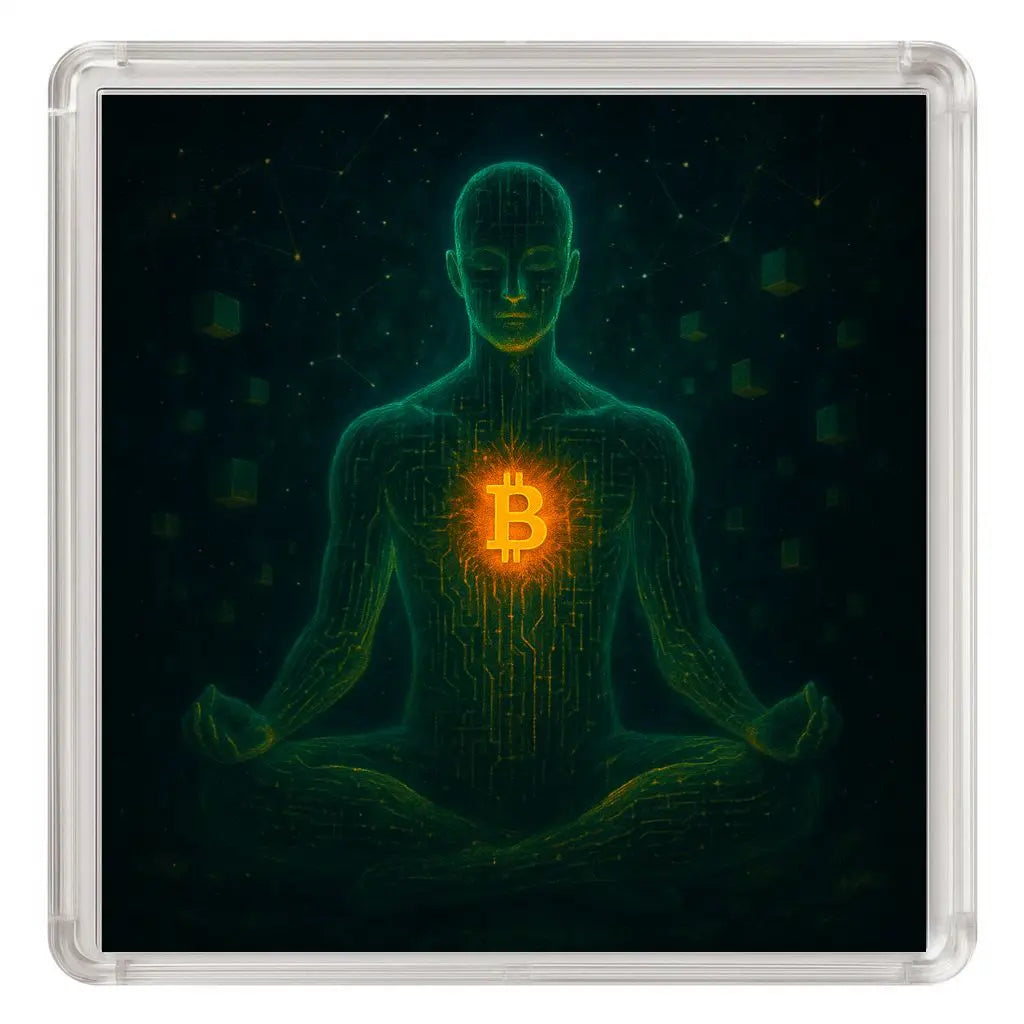
BITCOIN AND THE DIGITAL SOUL
Share
Bitcoin is not just a computer protocol. Those who reduce its existence to a series of lines of code, to one technical innovation among others, miss its true essence. Because behind the algorithms, the blocks, the keys, and the transactions, a deeper reality is at play: Bitcoin is a projection of our intimate relationship with time, scarcity, and trust. It is not a cold machine. It is a digital soul.
What is a soul, if not that which transcends matter and gives it meaning? The body acts, but the soul guides. Code executes, but the spirit it embodies transcends brute logic. Bitcoin was born out of a distrust of institutions, an intuition that humanity needed an unalterable reference point, a refuge beyond human manipulation. This act of creation was not purely technical: it was an existential gesture.
Bitcoin's soul is first manifested in its relationship to time. Each block is a heartbeat, a regular pulse that places humanity in a common rhythm. Unlike the artificial frenzy of financial markets, where speed destroys stability, Bitcoin moves at a walking pace, without rushing, like a deep breath. This long time is a lesson. It reminds us that value is not built in the moment, but over time. The hodler who holds onto his satoshis embodies this philosophy: he accepts patience, he puts himself in the school of time.
Then comes scarcity. In a world saturated with disposable objects, infinitely produced goods, and limitless printed money, Bitcoin introduces a radical paradox: 21 million, not one more. This arbitrary constraint is actually a revelation. For scarcity is not just an economic parameter, it is an existential experience. We are mortal, we know that our time and resources are limited. Bitcoin encodes this ontological truth. It is a digital memento mori, a permanent reminder that what is limited is precious.
And finally, trust. The human soul has always sought a place to place its trust. In religions, in laws, in leaders, in banks. But all these structures have betrayed us, sooner or later. Bitcoin does not require faith in an institution. It offers a radically new trust: trust in open code, in collective verification, in absolute transparency. It is an anthropological revolution. For the first time, trust is detached from humans to be anchored in an incorruptible protocol.
To call it a “digital soul” is not a poetic exaggeration. It is to acknowledge that Bitcoin has transcended its status as a tool. It has generated a culture, a community, a mythology. Like a nascent religion, it offers founding narratives (the Genesis Block, the mystery of Satoshi), rituals (the halving, the hodl), and symbols (the orange ₿ like a sun). This web of meaning is what distinguishes a mere invention from a true spiritual revolution.
Those who understand this know that owning Bitcoin isn't just about holding an asset. It's about entering into a different relationship with the world. Each satoshi held becomes a piece of this collective soul. It's an intimate experience: we feel connected to a chain that goes beyond our individual existences, a chain of blocks but also of meanings.
Of course, one could dismiss all this as an illusion. After all, Bitcoin is just a series of zeros and ones. But what isn't, in our digital civilization? Fiat money itself is just a collective fiction, sustained by the belief in states and their debts. The difference is that Bitcoin has chosen to embrace its symbolic character by making it incorruptible. If it is a fiction, it is an unalterable one.
The real issue, then, is whether we accept this digital soul, or reject it in the name of a materialism that sees only servers and electricity. But to deny Bitcoin's soul is to deny what we project into it: our desire for freedom, our rejection of corruption, our quest for truth. A soul exists only because we live it. And Bitcoin lives because millions of men and women choose every day to believe in it, to contribute to it, to participate in it.
Time will tell whether this soul will survive generations, or whether it will be absorbed by the powers it defies. But already, it has changed us. It has taught us patience, discipline, sovereignty. It has reminded us that in a world of simulacra, there are still truths that cannot be falsified.
Bitcoin is a currency, yes. But above all, it is a soul. A digital soul, forged in the fire of distrust, fueled by scarcity, punctuated by time, inhabited by trust. And this soul, as long as we carry it, will continue to beat. Block after block, like an unstoppable heart.
👉 Also read:
